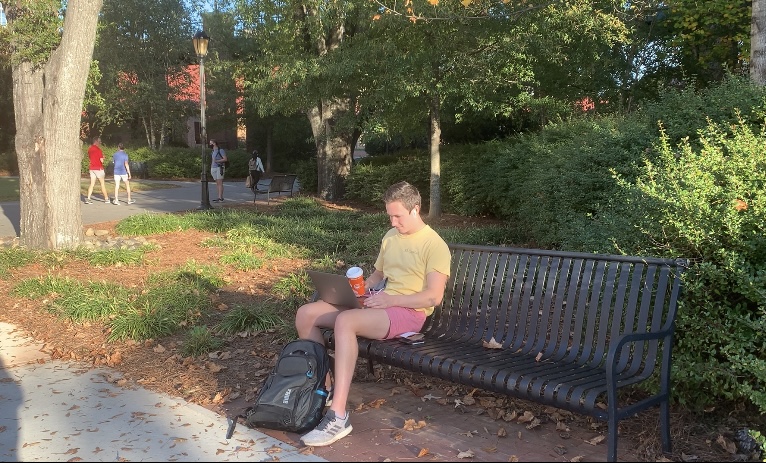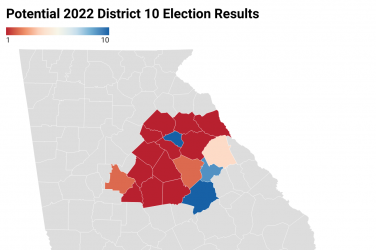Janet Frick, an associate professor in the University of Georgia Behavioral and Brain Sciences Program, said no one day this semester has been the same. Professors have had to make multiple adjustments this fall from the way they teach their classes to the way they interact with students.
“I think for faculty, just like for students, everything about the fall 2020 semester just feels like a lot of work and a lot of mental load,” Frick said.
To make on-campus learning this fall possible, the University of Georgia created a detailed plan for its return to full operations with various safety protocols. The plan outlined that class instruction would consist of a mix of in-person courses, virtual courses and hybrid courses, which combine both physical and virtual components. The variation in course formats was designed to maximize the space used inside the classrooms while still following social distancing measures. However, the new changes in the structure of classes have not come without challenges.
Unlike in past school terms, Frick said she is juggling both in-person and online classes and has had to adapt to what works best for her students as the semester goes along rather than completely planning all of her course lesson plans in advance.
“I’m teaching primarily freshmen. They like meeting during class time,” Frick said. “They like having a class to go to and a chance to interact with other students. The chats on our Zoom [classes] are very lively. I don’t think there’s any one size fits all, but the main thing I think is needed, no matter the format, is for students to feel like ‘the person teaching me is accessible.’”
She said the semester has been full of surprise adjustments, like getting used to talking in a mask all day and that the transition into the unknowns of teaching during a pandemic could have been smoother with more communication from the university’s administration.
There was a lot of, what felt to me and others, like inconsistent messaging over the summer. Some of that was coming from the Board of Regents, some of that was coming from just a lack of clarity about what the fall would look like,” Frick said.
However, despite all of the obstacles she has overcome and is still facing, Frick believes that the Zoom conference platform may be the one upside to the new world of teaching because of its flexibility. She said that since Zoom provides more accessibility, it could possibly become an alternative in the future for students who are sick but would still like to participate in the class session.
Experiences of Students with Disabilities Vary
Anthea Lebrocq has not been able to get the accessibility she needs though. An Australian international student pursuing a BFA in Arts and someone with multiple disabilities, ADHD (Attention-Deficit/Hyperactivity disorder) and Temporomandibular joint dysfunction (TMJ), Lebrocq requested that the UGA Disability Resource Center grant her accommodations to be able to take her major’s classes, which are mostly taught in-person, online.
The DRC’s website states that “each student’s situation is reviewed based on their specific needs.” Lebroqc said her request was denied.
“In the summer, I reached out to them and said ‘I know that UGA is going to want to be in-person, but I have to be online this semester because I have two comorbidities, and I’m 29 years old, which puts me in a bracket which means that I am nine times the risk of death than other students. The DRC said that because I hadn’t provided them [even] more legal documentation that further proved my disabilities, that they weren’t able to give me accommodations,” Lebrocq said.
Anthea Lebrocq’s situation is more rare but still a possibility that international students can face. Since she is not a U.S. citizen and here on a Visa as a student, she cannot register for U.S. health care other than the one University of Georgia Health Center provides. Thus, her status as a non-citizen has put her in a tough predicament as a person with disabilities.
Now required to meet physically for her courses, Lebrocq is especially aware of how students often talk in close range to each other in the hallways after class. On top of that, she expresses how her workload has increased this fall like never before to what she feels like is an increase by “200 percent.”
“It’s difficult for people who aren’t disabled to really understand what it’s like, obviously. There used to be more room to take a night off when it was all in-person… but because our teachers are not seeing the work that we’re doing, because they’re not in the classroom with us, the assumption is that we’re doing more work because we’re at home with our work,” Lebrocq said.
Virtual May Be Safer But Not Always Better
On the other hand, Kenia Garcia, a UGA transfer student, would rather be in Lebrocq’s shoes and taking classes face-to-face due to her learning style. She even had to drop a class due to her struggles with focusing with the virtual instruction.
I did not like hybrid classes. I did not like a single part of online [classes] because I felt like it was very hard to focus and give it my all [to] the material. I feel like I have to teach myself a majority of the time,” Garcia said.
Mental breaks from the fast-paced online world may be what students need most to help them acclimate to the changes this school year has brought. Garcia said that’s what the UGA Lamar Dodd school of Art has been providing its students with when it occasionally gives them Fridays off and allows them to interact with their peers.
“They cancel class and have activities you can do online. For example, they had one thing where you can play with other people in the school of music, and it was really fun. I felt like it really helped everyone,” Garcia said.
Expect More Physical Classes
In-person classes do not appear to be going anywhere, anytime soon.
The University System of Georgia Board of Regents approved to continue in-person instruction earlier this month. The University of Georgia is also planning to increase the amount of in-person classes for the Spring 2021 semester and allow as many students to attend class in-person as possible due to “little evidence of transmission of the coronavirus in classrooms.” The university has also canceled spring break for next semester as a COVID-19 precaution and has already been met with pushback to the announcement. The update via a tweet received dozens of student replies, most of which disapproved the cancelation.
“There has to be a point where the university looks into the mental health of the students because the university, right now, is denying that. They’re saying that students are doing okay, but there are some students that are not okay, and we need to look into that,” Garcia said.
Danielle Harvey is a senior majoring in journalism with a New Media Certificate in the Grady College of Journalism and Mass Communication at the University of Georgia.









Show Comments (0)